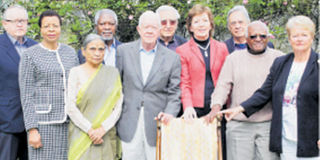‘The Elders’ chip in to ensure health access

The group of 'the elders'.PHOTO|COURTESY
What you need to know:
- It’s here that “The Elders,” a group of independent former leaders founded by Nelson Mandela to work for peace, justice and human rights, are expected to visit the country and raise voices high for people who miss out on universal health access.
- This Thursday, two members of The Elders group are visiting Tanzania to campaign for Universal Health Coverage (UHC) as part of the wider commitment in promoting Goal-3 of the Sustainable Development Goals (SDGs).
With only about 20 per cent of Tanzanians being able to access health insurance, the country faces an increasing gap in ensuring health access for everyone as per the commitments made by the government to achieve Sustainable Development Goals (SDGs).
It’s here that “The Elders,” a group of independent former leaders founded by Nelson Mandela to work for peace, justice and human rights, are expected to visit the country and raise voices high for people who miss out on universal health access.
This Thursday, two members of The Elders group are visiting Tanzania to campaign for Universal Health Coverage (UHC) as part of the wider commitment in promoting Goal-3 of the Sustainable Development Goals (SDGs).
Mary Robinson, the former President of Ireland and former UN High Commissioner for Human Rights, and Graça Machel, former Education Minister of Mozambique and a global advocate for health and women’s rights are the high-profile leaders expected to drive the campaign.
SDG-3 emphasises on ‘Good Health and Well-being’ and aims to ensure healthy lives and promote well-being of people for all at all ages. For The Elders, “It is crucial to ensuring women, girls and adolescents have a fair chance in life.”
As part of their programme, Mary Robinson and Graça Machel will visit a government dispensary to see for themselves the situation at the grassroots and hear from health workers, patients and other community members.
They believe that access to health care is a fundamental human right and is the best way to achieve the health sustainable development goal—and their position is stated in a media report that was released ahead of the campaign.
The Tanzanian government has embarked on plans to introduce universal and compulsory health insurance—through a Bill in parliament—and the move is seen as a game-changer in the country’s healthcare financing system.
If the Bill is passed by parliament, it means that all Tanzanians—from the formal and informal sector—would now be required by the law to access prepaid health services at health facilities across the country.
At least 36 million people rely on the Out of Pocket Payment (OPP) system to access healthcare services, according to data released in the National Assembly in 2016.
Under the current situation, only the formal employees can enjoy health cover. But for the 90 per cent of people who work in the informal sector, the government’s commitment to their health coverage is still very limited.
The Elders are set to be in Tanzania from 13-14 July to meet political leaders, civil society organisations and health professionals, says the report.




